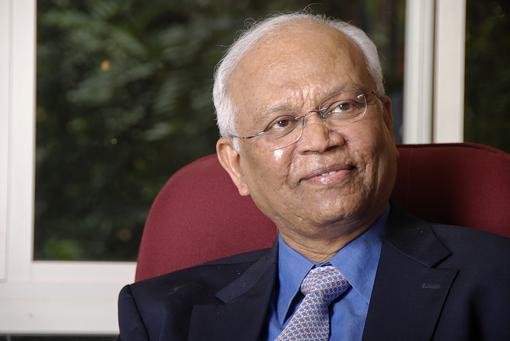Meet the new QEPrize judges: Raghunath Mashelkar
Categories: Chemical and healthcare

Dr Raghunath Mashelkar is a chemical engineer from India. He is currently National Research Professor, Chairman of India’s National Innovation Foundation and President of Global Research Alliance. We are pleased to announce that Dr Mashelkar will be joining the QEPrize judging panel for the 2019 prize.
Why did you become involved with the Queen Elizabeth Prize for Engineering?
Nobel prizes in chemistry, physics, economics, literature, peace and physiology or medicine acknowledged the path breaking human achievements in these fields. But for the first time, Queen Elizabeth Prize in Engineering recognises the great transformative and game changing role that engineers play. Most importantly, the prize recognises ground breaking innovations that bring global benefit to humanity. As a proud engineer, I feel extremely privileged to be a part of the eminent jury for the selection of this great prize.
What has been the proudest moment of your career so far?
The day was 17 July 1998. On that day, a boy, who struggled to get his education due to extreme poverty, who studied under street lights and who walked kilometres on barefoot to his school, got inducted as Fellow of Royal Society and had the honour of signing in the same book in which Newton and Einstein had signed. That boy was me! That was the proudest moment of my life.
Which engineer has inspired you most?
Leonardo da Vinci – for showing that an engineer can’t be an engineer in isolation. He combined his engineering prowess with painting, sculpting, architecture, science, music, mathematics, engineering, invention, anatomy, geology, astronomy, botany, writing, history, and cartography. His engineering concepts were outlandish at the time but visionary and ahead of their times in retrospect. He was testament that an engineer should never consider anything impossible – he designed flying machines, armoured fighting vehicles, concentrated solar power, an adding machine, and the double hull – in years 1400 and 1500!
What can we expect to see next in your field?
I am a chemical engineering scientist. When asked to vote for the greatest game changing technology in the 20th Century, Haber-Bosch process producing ammonia, which led to nitrogenous fertilizers, was singled out by many as the most impactful, as that transformed agriculture, which fed the exponentially growing population. I similarly hope that in my field there will be breakthroughs that will produce affordable and evergreen technologies, helping us triumph over every challenge in our future, be it climate change, sustainability, inequality…
What innovation do you think will change the world?
A clean, sustainable and stable source of energy for all of humanity’s needs – much like the sun! The threat of climate change is real, and does not discriminate – it will affect all of us severely. It threatens the very continuity of life on our planet. We need innovation that change the world by saving the world. I do believe we are getting there with a new, proven portfolio of renewable energy technologies.
Why is it so important that we attract young people into the field of engineering? What motivates you to be an advocate for young engineers?
The inspiring inscription on the Lamme Medal of The Institute of Electrical and Electronics Engineers, USA says it all. It says “The engineer views hopefully the hitherto unattainable”. Our young engineers are not only capable of having the spirit of `viewing’ the attainable but `achieving’ the seemingly unattainable.
Secondly, our youngest engineers are more diverse, more globally exposed than ever before – and that gives them a unique edge – that of empathy. Engineering without empathy is like a body without a soul. If more and more young engineers combine the attributes of not only innovation and passion, but also compassion, then we can truly create solutions for creating a truly inclusive world, which is the real need of the hour.
How will AI and Robotics change the world as we know it?
At the very least, by becoming our colleagues, simplifying our lives - perhaps even saving some lives. Al & Robotics are increasingly taking over the work that both human brain and brawn did. Does it mean that humans will become increasingly irrelevant? That is why I feel concepts like universal basic incomes need to be discussed in the global context – and now.



